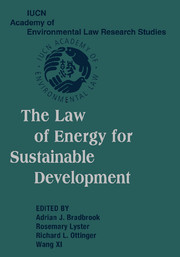Book contents
- Frontmatter
- Contents
- Acknowledgments
- Message from Kofi A. Annan, Secretary-General, United Nations
- Introduction – A Global Learned Society to Address Earth's Evolution: The IUCN Academy of Environmental Law
- Public Lectures on International Environmental Law
- PART ONE SUSTAINABLE DEVELOPMENT AND THE ROLE OF ENERGY LAW
- PART TWO LEGAL ISSUES IN CONTEMPORARY ENERGY LAW
- PART THREE INTERNATIONAL ENERGY LAW
- PART FOUR COMPARATIVE ENERGY LAW
- PART FIVE ELECTRICITY RESTRUCTURING
- PART SIX FINANCING FOR SUSTAINABLE ENERGY
- PART SEVEN CIVIL SOCIETY AND THE PROCEDURAL REQUIREMENTS OF ENERGY LAW FOR SUSTAINABLE DEVELOPMENT
- 30 The Role of Civil Society
- 31 Foundations in University Education
- 32 The Role of the Judiciary
- 33 Access to Justice and Citizen Enforcement
- 34 The Business Case and Approach to Sustainable Energy
- Index
32 - The Role of the Judiciary
Published online by Cambridge University Press: 10 August 2009
- Frontmatter
- Contents
- Acknowledgments
- Message from Kofi A. Annan, Secretary-General, United Nations
- Introduction – A Global Learned Society to Address Earth's Evolution: The IUCN Academy of Environmental Law
- Public Lectures on International Environmental Law
- PART ONE SUSTAINABLE DEVELOPMENT AND THE ROLE OF ENERGY LAW
- PART TWO LEGAL ISSUES IN CONTEMPORARY ENERGY LAW
- PART THREE INTERNATIONAL ENERGY LAW
- PART FOUR COMPARATIVE ENERGY LAW
- PART FIVE ELECTRICITY RESTRUCTURING
- PART SIX FINANCING FOR SUSTAINABLE ENERGY
- PART SEVEN CIVIL SOCIETY AND THE PROCEDURAL REQUIREMENTS OF ENERGY LAW FOR SUSTAINABLE DEVELOPMENT
- 30 The Role of Civil Society
- 31 Foundations in University Education
- 32 The Role of the Judiciary
- 33 Access to Justice and Citizen Enforcement
- 34 The Business Case and Approach to Sustainable Energy
- Index
Summary
In each jurisdiction where Environmental Law is strong and effective, we can see the role of the courts as an essential force. The courts serve a crucial role in ensuring that the systems recommended in Agenda 21 may become widespread…. Clear articulation of the basic legal principles underlying environmental law can guide society in shunning conduct that breaches the strictures of those principles. With the careful delineation of such principles in judicial opinions, the ministries of government can guide the affairs of state accordingly…. In short, as the courts advance the remedial objectives of Environmental Law, they advance the Rule of Law itself.
INTRODUCTION
One may well ask, “What has sustainable development got to do with the judiciary? Of what interest is the observance and enforcement of Environmental Law to society in general or to the judicial branch of government in particular?”
Part of the answer must be that a healthy, balanced legal system, led by a knowledgeable, honest, and fair judiciary, is critical to the harmonious and successful working of any modern society. The well-being of its people and of the environment of a nation is dependent upon an acceptable and universally respected system of laws; that is, a system that is accepted by all of the institutions of society, including the executive branch of government.
RELEVANCE OF JUDGES TO GOOD GOVERNANCE
Good governance is dependent on accountability of all of its organs to the people.
- Type
- Chapter
- Information
- The Law of Energy for Sustainable Development , pp. 560 - 566Publisher: Cambridge University PressPrint publication year: 2005

